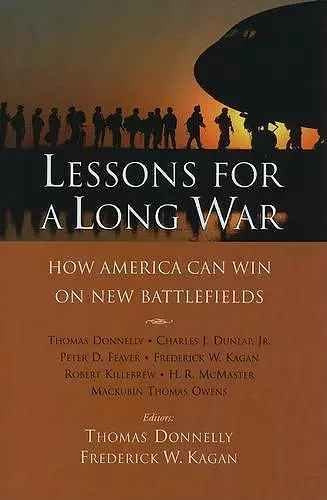Lessons for a Long War
How America Can Win on New Battlefields
Thomas Donnelly author Frederick W Kagan author
Format:Hardback
Publisher:AEI Press
Published:16th Jul '10
Should be back in stock very soon

As the guarantor of international security, the United States must commit to a long-term military presence in Iraq and Afghanistan. But what are the tools necessary to succeed on the new battlefields of the Long War? In this volume, a group of the foremost U.S. military officials and national security experts analyze the American experience in Iraq and Afghanistan thus far in order to map a way forward—not only for the military, but for diplomats, elected officials, and the American public. Thomas Donnelly, Frederick W. Kagan, and their coauthors offer several core lessons for success in The Long War. They argue that decentralizing command is the key to efficient operations on an ever-changing battlefield; that air power is the unsung hero of counterinsurgency warfare; that public opinion can influence crucial military decisions; and that the military should minimize its role in domestic affairs. Finally, although the battlefields have changed over the last fifty years, the authors contend that America's long-held counterinsurgency strategy—to foster political support at home, employ diplomacy overseas, and extend military assistance to allies—remains effective. The Long War will not soon be over. But, in the words of retired Army special forces officer Colonel Robert Killebrew, the United States already has "the tools it needs in order to prevail in the wars of the twenty-first century."
Men who move frequently between military and civilian government positions, academic institutions, and various institutes, identify lessons from the US Global War on Terror and its successors. The essays were written in 2007 and 2008 as part of a larger project on US land power, but remain relevant as the Obama administration continues the war mongering of the Bush/Cheney years. They cover domestic politics and the long war; renegotiating the civil-military bargain after 9/11; centralization versus decentralization in preparing for and practicing mission command in counterinsurgency operations; the dysfunctional or dynamic Air Force and 21st-century conflicts; and strategy, counterinsurgency, and the Army. * Scitech Book News *
Since September 11 the phrase "the long war" has gradually emerged as a theoretical and practical alternative to "war on terrorism." "Long War" is defined, according to the editors of this new collection, as "an effort to create a new— and by American standards better—political order across the Greater Middle East." Donnelly and Kagan, leading military analysts with the American Enterprise Institute, have assembled a distinguished team of contributors. Peter D. Feaver suggests a "Long War" model will temper current partisan divisions, as did the cold war. Mackubin Owens sees "Long War" as a paradigm for reducing civil-military tensions exacerbated by a focus on immediate solutions. A very persuasive Charles J. Dunlap Jr. calls for the air force to explain to government, the press, and the public why air power is both effective and necessary, despite civilian deaths. Robert Killibrew concludes the volume by calling for the army to prepare for "hybrid" insurgencies: complex synergies of terror, combat, and public relations. "Long War" is a comprehensive approach, as opposed to specific efforts to suppress specific groups, and it receives serious consideration in this policy-oriented book. * Publishers Weekly *
ISBN: 9780844743295
Dimensions: 239mm x 164mm x 18mm
Weight: 417g
180 pages